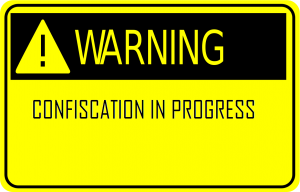September 24, 2013
By: Brian Mahany, Tax Attorney

America is running out of money. Technically, one could argue that the nation is already bankrupt. Governments, however, have the ability to print more money. As long as the people have confidence in the economy, the currency retains value. Experts have warned for many years – decades – that the American economy is running on fumes. Government printing presses simply can’t keep up with the promises of politicians and the demands of its people. So what’s next?
We have long worried about confiscation of private wealth. If you think it can’t happen here, it already has. We are not talking some crazy conspiracy theories and we didn’t wake up this morning with a tin foil hat. On April 5th, 1933, President Franklin Roosevelt signed Executive Order 6102, which forbade the “Hoarding of gold coin, gold bullion and gold certificates within the continental United States.” His order criminalized the possession of monetary gold by any individual, partnership, association or corporation.
Obviously, after the Depression, Americans were once again allowed to hold gold but many have privately worried that such an action could happen again. Although we are not in a depression at this writing, the storm clouds have been building on the horizon for quite some time.
And then came the rains.
Last week, major media mostly missed a major story from Poland. Faced with a mounting fiscal crisis, the government of Poland quietly confiscated much of the country’s private pension plans. President Roosevelt’s Executive Order used the word “hoarding” – it prevented individuals from hoarding (owning) gold. Taking a page from Roosevelt’s playbook, Poland didn’t “confiscate” the pension and retirement funds of its citizens, it engaged in “pension overhaul”.
Officially, holders of private pensions now will have their assets transferred into the state “guaranteed” system. While that may sound great to a few folks, the government’s track record on managing money is usually never very good and certainly not as good as the private sector.
More ominously, Poland had run out of money. The only reason it confiscated private wealth was because it had run out of public wealth. Are these the folks you want in charge of your retirement needs?
On some insidious level, the Polish plan was brilliant. By transferring billions of dollars on to the government’s books, the government now has the ability to borrow even more money and go deeper in debt.
Stealing money from those who saved is not the solution. Nor is making promises that rely on tomorrow’s dollars. (Just ask any of the retired firefighters or cops in Detroit about their “guaranteed” pensions.)
The government’s tireless crusade against unreported foreign accounts is aimed at stemming tax evasion. Someday, however, the focus may shift and it may become impossible to move money offshore. Many civilized countries already prohibit or limit the outflows of private wealth.
The lessons here are several:
1) As social security is running out of money (the disability program will run dry in just a few years), don’t expect miracles from Washington. The government’s choices are limited and there is a real threat of similar pension “overhaul” in the U.S.
2) It is perfectly legal to transfer wealth offshore. But be careful how you do so. Being careful means care in choosing what country you place your assets (Poland is probably not on anyone’s short list these days.) It also means care in making sure you follow the law.
Although opening a foreign account is legal, the failure to properly report the account and file an FBAR for even one year could result in a $100,000 fine or a civil penalty of 50% of the highest account balance.
Moving money offshore requires a good accountant with knowledge of FATCA and FBAR reporting rules. It also requires someone with knowledge of foreign banking practices – Bobby Casey’s folks can really help there. If you already have money offshore, however, and have failed to report those accounts, seek help from an experienced FBAR lawyer. There are amnesty and other programs that can get you back in good graces with the IRS and help you hold on to your money.
About the author. Brian Mahany is a tax lawyer and frequenter contributor to Global Wealth Protection. He and his team of FBAR lawyers have helped taxpayers across the world. Brian can be reached through his firm, Mahany & Ertl or directly at (414) 704-6731.

